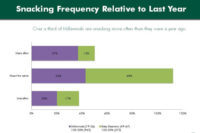Millennials Shifting Brand Preferences

In its research, Hartman Group found that Millennials (ages 16-30) are linked as consumers to complex household and family structures, whether by breadth of lifestages they represent, living with their parents as young adults, or on their own with or without children -- all of which influence changes in brand preferences in food, beverages and other consumer packaged goods categories.
"We've been observing for several years now the influence of the household on brand preferences," said Laurie Demeritt, Hartman Group president. "We've maintained that while significant attention and marketing spend have shifted to shopper and retail-oriented promotions, the formation of brand preferences and choices occur primarily in the household, not in the store."
Millennials begin to shift their brand preferences away from the brands they grew up with upon leaving home. Some 20% switch almost entirely to different brands when they move out on their own. While Millennials characterize their food and beverage brands and products as more healthy, organic and natural than those of their parents, they also say they are more expensive, indicating an expectation for paying a premium for higher-quality food and beverage experiences.
"These findings do not suggest that Millennials are averse to forging a relationship with a brand," said Demeritt. "It means that companies and agencies should rethink and re-imagine how they market to them. One of the most effective ways to connect with Millennials, in fact, may be in not marketing directly to them. Millennials don't want to be advertised to, they want to be advertised with."
According to the report, some of the most popular ad campaigns with Millennials have almost nothing to do with the product itself; they are about fun and entertainment.
From the September 30, 2011, Prepared Foods' Daily News.
Looking for a reprint of this article?
From high-res PDFs to custom plaques, order your copy today!





